2003 Rugby World Cup

 Clash Royale CLAN TAG#URR8PPP
Clash Royale CLAN TAG#URR8PPP
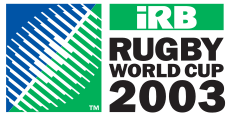 | |
| Tournament details | |
|---|---|
| Host nation | |
| Dates | 10 October – 22 November (44 days) |
| No. of nations | 20 (80 qualifying) |
| Final positions | |
Champions | |
| Runner-up | |
| Third-place | |
| Tournament statistics | |
| Matches played | 48 |
| Attendance | 1,837,547 (38,282 per match) |
| Top scorer(s) | |
| Most tries | (7 tries each) |
← 1999 2007 → | |
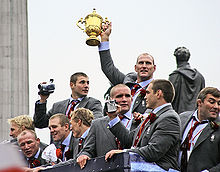
England 2003 World Cup winners
The 2003 Rugby World Cup was the fifth Rugby World Cup and was won by England. Originally planned to be co-hosted by Australia and New Zealand, all games were shifted to Australia following a contractual dispute over ground signage rights between the New Zealand Rugby Union and Rugby World Cup Limited. The pre-event favourites were England, regarded by many at the time as the best team in the world. New Zealand, France, South Africa and defending champions Australia were also expected to make strong showings, with New Zealand being second favourites after victory in the southern-hemisphere Tri-Nations championship.
The tournament began with host nation Australia defeating Argentina 24–8 at Telstra Stadium in Sydney. Australia went on to defeat New Zealand 22–10 in the semifinal, to play England in the final. Along with a try to Jason Robinson, Jonny Wilkinson kicked four penalties and then a drop-goal in extra time to win the game 20–17 for England, who became the first northern hemisphere team to win the Webb Ellis Cup.
Contents
1 Qualifying
2 Host
3 Venues
4 Squads
5 Referees
6 Pools and format
7 Summary
7.1 Pool Stage
7.2 Knock-out stage
7.3 Final
7.4 Post-final
8 Pool stage
8.1 Pool A
8.2 Pool B
8.3 Pool C
8.4 Pool D
9 Knockout stage
9.1 Quarter-finals
9.2 Semi-finals
9.3 Third-place play-off
9.4 Final
10 Statistics
10.1 Team
10.2 Top point scorers
10.3 Top try scorers
11 Broadcasters
12 References
13 External links
Qualifying
The following 20 teams, shown by region, qualified for the 2003 Rugby World Cup. Of the 20 teams, eight of those places were automatically filled by the teams that reached the quarter-final stages in 1999, including hosts and world champions Australia and did not have to play any qualification matches. A record 81 nations from five continents were involved in the qualification process designed to fill the remaining 12 spots, which began on 23 September 2000.
| Africa | Americas | Europe | Oceania/Asia |
|---|---|---|---|
|
|
|
|
Host
Australia won the right to host the 2003 World Cup without the involvement of New Zealand after a contractual dispute over ground signage rights between the New Zealand Rugby Football Union and Rugby World Cup Limited.[1] Australia and New Zealand had been expected to co-host — with New Zealand expected to host 23 of the 48 matches — but New Zealand's insistence on amending the provisions relating to stadium advertising was unacceptable to the IRB.[2]
Venues
The overall stadium capacity was 421,311 across 11 venues. This was a reduction from the 1999 Rugby World Cup in Wales (with games also held in England, France, Ireland, Northern Ireland and Scotland) which had a total capacity of 654,677 across 18 venues.
The Adelaide Oval underwent a AU$20 million redevelopment for the 2003 Rugby World Cup, financed entirely by the South Australian Cricket Association, with two new grandstands built adjacent to the Victor Richardson Gates. Suncorp Stadium in Brisbane (formerly Lang Park) was a new A$280 million venue designed specifically for rugby league, rugby union and soccer, and was opened just prior to the start of the 2003 World Cup with a capacity of 52,500, some 12,000 more than the old Lang Park could hold. The Central Coast Stadium was also a newly built rectangular venue built for union, league and soccer. It was built on the site of the old Grahame Park ground and was opened in February 2000 at a cost of A$30 million.
The Sydney Football Stadium was one of two venues in Sydney that were used for football during the 2000 Olympic Games. The other venue in Sydney was Stadium Australia, which was the centrepiece of the 2000 Olympic Games. By 2003 Stadium Australia was known as Telstra Stadium. It was built as the main stadium of the 2000 Olympics at a cost of $690 million and with a capacity of 83,500 was the biggest stadium used in the 2003 World Cup (the stadium had an original capacity of 110,000 before undergoing a post-Olympics redevelopment from 2001-2003). The only stadium with a retractable roof used was the Docklands Stadium in Melbourne. Although the Docklands Stadium has movable seating which brings four sections of the lower bowl forward by 18 metres to create a more rectangular surround for the pitch, this was not used during the World Cup as it reduces the seating capacity of the stadium by approximately 3,500.
Sydney | Melbourne | Brisbane | |||
|---|---|---|---|---|---|
Stadium Australia | Sydney Football Stadium | Docklands Stadium | Lang Park | ||
| Capacity: 83,500 | Capacity: 42,500 | Capacity: 56,347 | Capacity: 52,500 | ||
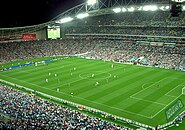 | 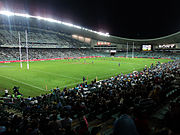 |  |  | ||
Perth | Adelaide | ||||
Subiaco Oval | Adelaide Oval | ||||
| Capacity: 42,922 |  Sydney Wollongong Canberra Townsville Brisbane Adelaide Launceston Melbourne Gosford Perth | Capacity: 33,597 | |||
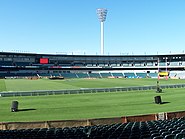 | 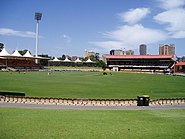 | ||||
Townsville | Canberra | ||||
Willows Sports Complex | Canberra Stadium | ||||
| Capacity: 26,500 | Capacity: 25,011 | ||||
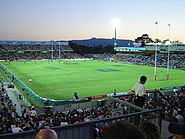 |  | ||||
Gosford | Launceston | Wollongong | |||
Central Coast Stadium | York Park | Wollongong Showground | |||
| Capacity: 20,059 | Capacity: 19,891 | Capacity: 18,484 | |||
 | 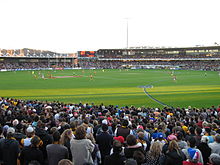 | 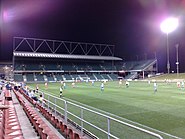 | |||
Squads
Referees
|
|
- Touch judges and television match officials
|
|
Source:[3]
Pools and format
| Pool A | Pool B | Pool C | Pool D |
|---|---|---|---|
|
|
|
|
Following the complex format used in the 1999 Rugby World Cup a new simpler format was introduced and the twenty teams were divided into four pools of five nations, with the top two in each pool moving on to the knock-out quarter-final stage. With forty matches to be played in the pool stage on top of the knock-out matches would make the event the largest Rugby World Cup tournament to be played to date. For the first time, a bonus point system was implemented in pool play. This system is identical to that long used in Southern Hemisphere tournaments, and was soon adopted in most European competitions (though not in the Six Nations until 2017):
- 4 points for a win
- 2 points for a draw
- 0 points for a loss (before possible bonus points)
- 1 bonus point for scoring 4 or more tries, or a loss by 7 points or fewer
A total of 48 matches (40 pool stage and eight knock-out) were played throughout the tournament over 42 days from 10 October to 22 November 2003.
Summary
Pool Stage
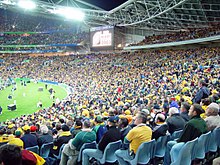
The opening game at Telstra Stadium between Australia and Argentina
The ARU's main promotion for the event was "Show Your True Colours". The Australian media criticised the competition early in the tournament as the smaller nations were crushed by the rugby superpowers by 60 points or more. However, some of these smaller, third tier nations, such as Japan, acquitted themselves well in their opening matches. The South Pacific island countries of Fiji, Tonga and Samoa were reported as being handicapped as several of their key players who play abroad being warned by their clubs that their contracts would not be renewed if they played in the competition.
In the event, the pool stage of the competition played out largely as expected, with some tension as to whether some of the "developing" nations would overtake some of the weaker major countries for the second quarter-final qualification place in each pool – in pool A, Argentina lost to Ireland by only one point, which would otherwise have carried them into the quarter-finals in Ireland's place; similarly in pool B Fiji lost to Scotland by only two points, while Italy put up a good performance in pool D. In pool C, Samoa gave England a fright with an adventurous approach that allowed them to take an early lead, however, but England overcame the early deficit and won. This match was marked by controversy, as England fielded 16 players at one point during the game.[4]
The big clashes ran mainly to form. South Africa came through the pool in second place, after they lost to England, which meant a quarter final against New Zealand. Australia however only beat Ireland by one point to top their pool, whilst Wales pushed the All Blacks to the wire, after adopting an outgoing style of play with a fringe selection. France beat Scotland to round out the quarter-finals.
Knock-out stage
The quarter-final stage produced the widely predicted set of semi-finalists, although England again made heavy weather of defeating a resurgent Wales. England were widely rated the world's best team, but they struggled, at least in the first half, against a Welsh side full of belief after their game against New Zealand: although England pulled away in the second half after the tactical substitution of Catt for Tindall, a late Welsh try gave the scoreline the respectability that their first-half performance had deserved. France destroyed an Irish side who had gone into the match hopeful of a win, scoring 31 early points to put the game out of reach. In the other quarter-finals, a disappointing South Africa fell to New Zealand and Australia defeated the Scots.
The first semi-final produced an upset, when Australia defeated the fancied New Zealand to become the first defending champions to reach the following championship final. Unfortunately, it was probably the last match for Australian star Ben Darwin, who injured his neck in a scrum. Although Darwin never played rugby again, the actions of Kees Meeuws – who immediately stopped exerting pressure when he heard the call "neck neck neck" – may well have saved his opponent's life and certainly prevented further injury. The match was decided by a Stirling Mortlock interception try, after a loose pass from highly rated All Blacks fly-half Carlos Spencer. George Gregan taunted his opponents in defeat with the comment, "Four more years boys, four more years".[5][6]
The second semi-final saw France face England. The boot of Jonny Wilkinson was the difference between the two sides, with England coming out victors in torrential rain: although France scored the game's only try after an early English line-out error, they never seriously threatened the English line otherwise. And with handling being difficult in the wet and windy conditions, England's superior forward pressure and territorial control forced France to concede a slew of penalties, of which Wilkinson kicked five, also adding three drop goals (two off his less-favoured right boot) - a remarkable display considering that the swirling winds made accurate kicking as difficult as the rain and mud made passing and running.
Final
The final between Australia and England was played at Sydney's Telstra Stadium in front of a crowd of 82,957. Australia opened the scoring after they decided to run a penalty instead of kicking for touch. Lote Tuqiri beat England's right wing, Jason Robinson, to a high cross-field kick and went over for the first try, but Elton Flatley was not able to add the conversion.

Celebrations in Trafalgar Square
The rest of the half was a tight affair, with England edging in front from applying pressure and Jonny Wilkinson's boot put them up to a 9–5 lead after Australian indiscipline gave away several penalties, but were unable to capitalise on their territory. Towards the end of the first half, England stretched their lead further. Lawrence Dallaglio made a break and popped the ball inside to Jonny Wilkinson, who drew the defence before putting Robinson away in the corner for a try. The conversion was missed, but England went in at half time leading by 14–5.
In the second half Australia tightened their discipline, and solid play forced mistakes from England. The game swung from end to end, with both sides having try-scoring opportunities, but neither able to take them. Australia managed to get points on the board and Elton Flatley scored two penalties to make the score 14–11 to England. In the 79th minute, Australia were putting pressure on England in their half, and Australia were awarded a penalty right before full-time, with the potential to tie the scores. Flatley converted it to make the score 14–14 and take the game into an additional 20 minutes' extra time.
England opened the scoring in extra time with another Wilkinson penalty, but with two and a half minutes of extra time remaining Australia were awarded another penalty, which Flatley kicked successfully. With 20 seconds left before sudden death, Wilkinson scored a drop goal to win the match and with it the world championship.
Post-final
Three days after the final, the World Cup winning England team landed at Heathrow Airport in the early hours of the morning, emerging from their plane to a huge reception, despite the time.[7] On 8 December, a national day of celebration took place in the form of a massive victory parade in the streets of London.[8]
Pool stage
| Qualified for the quarter-finals |
Pool A
| Team | Pld | W | D | L | PF | PA | BP | Pts |
|---|---|---|---|---|---|---|---|---|
| 4 | 4 | 0 | 0 | 273 | 32 | 2 | 18 | |
| 4 | 3 | 0 | 1 | 141 | 56 | 3 | 15 | |
| 4 | 2 | 0 | 2 | 140 | 57 | 3 | 11 | |
| 4 | 1 | 0 | 3 | 65 | 192 | 1 | 5 | |
| 4 | 0 | 0 | 4 | 28 | 310 | 0 | 0 |
10 October 2003 |
Australia | 24–8 | |
|---|---|---|
Try: Sailor 20' Roff 74' Con: Flatley Pen: Flatley (4) | Try: Corleto 72' Pen: M. Contepomi |
Telstra Stadium, Sydney Attendance: 81,350 Referee: Paul Honiss (New Zealand) |
11 October 2003 |
Ireland | 45–17 | |
|---|---|---|
Try: S. Horgan Wood Hickie (2) Costello Con: Humphreys (3) O'Gara Pen: Humphreys (4) | Try: Penalty try Maftei Con: Tofan Vioreanu Pen: Tofan |
Central Coast Stadium, Gosford Attendance: 19,123 Referee: Jonathan Kaplan (South Africa) |
14 October 2003 |
Argentina | 67–14 | |
|---|---|---|
Try: Méndez Bouza (2) J. Fernández Miranda Penalty try (2) Gaitán (3) N. Fernández Miranda Con: Quesada (7) Pen: Quesada | Try: Grobler Husselman Con: Wessels (2) |
Central Coast Stadium, Gosford Attendance: 17,887 Referee: Nigel Whitehouse (Wales) |
18 October 2003 |
Australia | 90–8 | |
|---|---|---|
Try: Flatley Rogers (3) Burke (2) Larkham (2) Mortlock Roff Giteau Tuqiri Smith Con: Flatley (11) Pen: Flatley | Try: Toderasc Pen: Tofan |
Suncorp Stadium, Brisbane Attendance: 48,778 Referee: Pablo De Luca (Argentina) |
19 October 2003 |
Ireland | 64–7 | |
|---|---|---|
Try: Quinlan (2) Dempsey Hickie Horan Miller (2) G. Easterby S. Horgan Kelly Con: O'Gara (7) | Try: Powell Con: Wessels |
Aussie Stadium, Sydney Attendance: 35,382 Referee: Andrew Cole (Australia) |
22 October 2003 |
Argentina | 50–3 | |
|---|---|---|
Try: Gaitán Hernández (2) M. Contepomi N. Fernández Miranda Bouza (2) Con: J. Fernández Miranda (4) Quesada (2) Pen: J. Fernández Miranda | Pen: Ionut Tofan |
Aussie Stadium, Sydney Attendance: 33,673 Referee: Chris White (England) |
25 October 2003 |
Australia | 142–0 | |
|---|---|---|
Try: Latham (5) Lyons Mortlock Tuqiri (3) Penalty try Rogers (2) Paul Giteau (3) Grey Turinui (2) Burke Roe Con: Rogers (16) |
Adelaide Oval, Adelaide Attendance: 28,196 Referee: Joël Jutge (France) |
Largest winning margin in Rugby World Cup history.
26 October 2003 |
Argentina | 15–16 | |
|---|---|---|
Pen: Quesada (3) Drop: Quesada Corleto | Try: Quinlan Con: Humphreys Pen: Humphreys O'Gara (2) |
Adelaide Oval, Adelaide Attendance: 30,203 Referee: André Watson (South Africa) |
30 October 2003 |
Namibia | 7–37 | |
|---|---|---|
Try: Isaacs Con: Wessels | Try: Petrichei Sirbu Chiriac Teodorescu Sauan Con: Tofan (3) Pen: Tofan (2) |
York Park, Launceston Attendance: 15,457 Referee: Peter Marshall (Australia) |
1 November 2003 |
Australia | 17–16 | |
|---|---|---|
Try: Smith Pen: Flatley (3) Drop: Gregan | Try: O'Driscoll Con: O'Gara Pen: O'Gara (2) Drop: O'Driscoll |
Telstra Dome, Melbourne Attendance: 54,206 Referee: Paddy O'Brien (New Zealand) |
Pool B
| Team | Pld | W | D | L | PF | PA | BP | Pts |
|---|---|---|---|---|---|---|---|---|
| 4 | 4 | 0 | 0 | 204 | 70 | 4 | 20 | |
| 4 | 3 | 0 | 1 | 102 | 97 | 2 | 14 | |
| 4 | 2 | 0 | 2 | 98 | 114 | 2 | 10 | |
| 4 | 1 | 0 | 3 | 86 | 125 | 2 | 6 | |
| 4 | 0 | 0 | 4 | 79 | 163 | 0 | 0 |
11 October 2003 |
France | 61–18 | |
|---|---|---|
Try: Dominici (2) Harinordoquy Jauzion (3) Ibañez Con: Michalak (4) Pen: Michalak (6) | Try: Naevo Caucaunibuca Con: Little Pen: Little (2) |
Suncorp Stadium, Brisbane Attendance: 46,795 Referee: Alain Rolland (Ireland) |
12 October 2003 |
Scotland | 32–11 | |
|---|---|---|
Try: Paterson (2) Grimes Taylor Danielli Con: Paterson Townsend Pen: Paterson | Try: Onozawa Pen: Hirose (2) |
Dairy Farmers Stadium, Townsville Attendance: 19,170 Referee: Stuart Dickinson (Australia) |
15 October 2003 |
Fiji | 19–18 | |
|---|---|---|
Try: Naevo Con: Little Pen: Little (4) | Try: Van Zyl Schubert Con: Hercus Pen: Hercus (2) |
Suncorp Stadium, Brisbane Attendance: 30,990 Referee: Joël Jutge (France) |
18 October 2003 |
France | 51–29 | |
|---|---|---|
Try: Michalak Rougerie (2) Pelous Dominici Crenca Con: Michalak (5) Merceron Pen: Michalak (3) | Try: Konia Ohata Con: Kurihara (2) Pen: Kurihara (5) |
Dairy Farmers Stadium, Townsville Attendance: 21,309 Referee: Alan Lewis (Ireland) |
20 October 2003 |
Scotland | 39–15 | |
|---|---|---|
Try: Danielli (2) Kerr Townsend Paterson Con: Paterson (4) Pen: Paterson (2) | Pen: Hercus (5) |
Suncorp Stadium, Brisbane Attendance: 46,796 Referee: Jonathan Kaplan (South Africa) |
23 October 2003 |
Fiji | 41–13 | |
|---|---|---|
Try: Tuilevu (2) Ligairi (2) Vunibaka Con: Little (2) Pen: Little (4) | Try: Miller Con: Miller Pen: Miller Drop: Miller |
Dairy Farmers Stadium, Townsville Attendance: 17,269 Referee: Nigel Whitehouse (Wales) |
Andy Miller's drop goal, at 52 metres, remains the longest in Rugby World Cup history.
25 October 2003 |
France | 51–9 | |
|---|---|---|
Try: Betsen Harinordoquy Michalak Galthié Brusque Con: Michalak (3) Merceron Pen: Michalak (4) Drop: Michalak Brusque | Pen: Paterson (3) |
Telstra Stadium, Sydney Attendance: 78,974 Referee: David McHugh (Ireland) |
27 October 2003 |
Japan | 26–39 | |
|---|---|---|
Try: Kurihara Ohata Con: Kurihara (2) Pen: Kurihara (4) | Try: Hercus Eloff Schubert Van Zyl Khasigian Con: Hercus (4) Pen: Hercus (2) |
Central Coast Stadium, Gosford Attendance: 19,653 Referee: Steve Walsh (New Zealand) |
31 October 2003 |
France | 41–14 | |
|---|---|---|
Try: Liebenberg (3) Poux Bru Con: Merceron (2) Pen: Merceron (3) Drop: Yachvili | Try: Hercus Schubert Con: Hercus (2) |
WIN Stadium, Wollongong Attendance: 17,833 Referee: Paul Honiss (New Zealand) |
1 November 2003 |
Scotland | 22–20 | |
|---|---|---|
Try: Smith Con: Paterson Pen: Paterson (5) | Try: Caucaunibuca (2) Con: Little (2) Pen: Little (2) |
Aussie Stadium, Sydney Attendance: 37,137 Referee: Tony Spreadbury (England) |
Pool C

South Africa vs Georgia, 24 October 2003
| Team | Pld | W | D | L | PF | PA | BP | Pts |
|---|---|---|---|---|---|---|---|---|
| 4 | 4 | 0 | 0 | 255 | 47 | 3 | 19 | |
| 4 | 3 | 0 | 1 | 184 | 60 | 3 | 15 | |
| 4 | 2 | 0 | 2 | 138 | 117 | 2 | 10 | |
| 4 | 1 | 0 | 3 | 56 | 255 | 0 | 4 | |
| 4 | 0 | 0 | 4 | 46 | 200 | 0 | 0 |
11 October 2003 |
South Africa | 72–6 | |
|---|---|---|
Try: Van der Westhuizen (3) Van Niekerk Botha (2) Delport Fourie Bands Rossouw Scholtz Greef Con: Koen (5) Hougaard | Pen: Aguirre (2) |
Subiaco Oval, Perth Attendance: 16,906 Referee: Paddy O'Brien (New Zealand) |
12 October 2003 |
England | 84–6 | |
|---|---|---|
Try: Tindall Dawson Thompson Back Dallaglio Greenwood (2) Regan Cohen (2) Robinson Luger Con: Wilkinson (5) Grayson (4) Pen: Wilkinson (2) | Pen: Urjukashvili Jimsheladze |
Subiaco Oval, Perth Attendance: 25,501 Referee: Pablo De Luca (Argentina) |
15 October 2003 |
Samoa | 60–13 | |
|---|---|---|
Try: Fa'asavalu (2) Lima (2) Tagicakibau Fa'atau Lemalu Vili Feaunati Palepoi Con: Va'a (3) Vili (2) | Try: Capó Lemoine Pen: Aguirre |
Subiaco Oval, Perth Attendance: 22,020 Referee: David McHugh (Ireland) |
18 October 2003 |
South Africa | 6–25 | |
|---|---|---|
Pen: Koen (2) | Try: Greenwood Con: Wilkinson Pen: Wilkinson (4) Drop: Wilkinson (2) |
Subiaco Oval, Perth Attendance: 38,834 Referee: Peter Marshall (Australia) |
19 October 2003 |
Georgia | 9–46 | |
|---|---|---|
Pen: Jimsheladze (2) Drop: Jimsheladze | Try: Tagicakibau Va'a Sititi So'oialo Feaunati Lima Con: Va'a (5) Pen: Va'a (2) |
Subiaco Oval, Perth Attendance: 21,507 Referee: Alain Rolland (Ireland) |
24 October 2003 |
South Africa | 46–19 | |
|---|---|---|
Try: Rossouw (2) Hougaard Van Niekerk Fourie Botha Burger Con: Hougaard (4) Pen: Hougaard | Try: Dadunashvili Con: Jimsheladze Pen: Jimsheladze (3) Kvirikashvili |
Aussie Stadium, Sydney Attendance: 34,308 Referee: Stuart Dickinson (Australia) |
26 October 2003 |
England | 35–22 | |
|---|---|---|
Try: Back Penalty try Balshaw Vickery Con: Wilkinson (3) Pen: Wilkinson (2) Drop: Wilkinson | Try: Sititi Con: Va'a Pen: Va'a (5) |
Telstra Dome, Melbourne Attendance: 50,647 Referee: Jonathan Kaplan (South Africa) |
28 October 2003 |
Georgia | 12–24 | |
|---|---|---|
Pen: Urjukashvili Kvirikashvili (3) | Try: Cardoso Lamelas Brignoni Con: Aguirre (2) Menchaca Pen: Menchaca |
Aussie Stadium, Sydney Attendance: 28,576 Referee: Kelvin Deaker (New Zealand) |
1 November 2003 |
South Africa | 60–10 | |
|---|---|---|
Try: Van Niekerk Muller Hougaard Smith Willemse Fourie Van der Westhuyzen De Kock Con: Hougaard (5) Koen (2) Pen: Hougaard Drop: Hougaard | Try: Palepoi Con: Va'a Pen: Va'a |
Suncorp Stadium, Brisbane Attendance: 48,496 Referee: Chris White (England) |
2 November 2003 |
England | 111–13 | |
|---|---|---|
Try: Moody Lewsey (5) Balshaw (2) Catt (2) Gomarsall (2) Luger Abbott Robinson (2) Greenwood Con: Grayson (11) Catt (2) | Try: Lemoine Con: Menchaca Pen: Menchaca (2) |
Suncorp Stadium, Brisbane Attendance: 46,233 Referee: Nigel Whitehouse (Wales) |
Pool D
| Team | Pld | W | D | L | PF | PA | BP | Pts |
|---|---|---|---|---|---|---|---|---|
| 4 | 4 | 0 | 0 | 282 | 57 | 4 | 20 | |
| 4 | 3 | 0 | 1 | 132 | 98 | 2 | 14 | |
| 4 | 2 | 0 | 2 | 77 | 123 | 0 | 8 | |
| 4 | 1 | 0 | 3 | 54 | 135 | 1 | 5 | |
| 4 | 0 | 0 | 4 | 46 | 178 | 1 | 1 |
11 October 2003 |
New Zealand | 70–7 | |
|---|---|---|
Try: B. Thorn R. Thorne Howlett (2) Spencer (2) Rokocoko (2) Marshall Carter MacDonald Con: Carter (6) Pen: Spencer | Try: Phillips Con: Peens |
Telstra Dome, Melbourne Attendance: 41,715 Referee: Andrew Cole (Australia) |
12 October 2003 |
Wales | 41–10 | |
|---|---|---|
Try: Parker Cooper M. Jones Charvis Thomas Con: Harris (5) Pen: Harris (2) | Try: Tkachuk Con: Pritchard Drop: Ross |
Telstra Dome, Melbourne Attendance: 24,874 Referee: Chris White (England) |
15 October 2003 |
Italy | 36–12 | |
|---|---|---|
Try: M. Dallan D. Dallan (2) Con: Wakarua (3) Pen: Wakarua (5) | Try: Payne Tu'ifua Con: Tu'ipulotu |
Canberra Stadium, Canberra Attendance: 18,967 Referee: Steve Walsh (New Zealand) |
17 October 2003 |
New Zealand | 68–6 | |
|---|---|---|
Try: Ralph (2) So'oialo (2) Muliaina (4) Meeuws Nonu Con: Carter (9) | Pen: Barker (2) |
Telstra Dome, Melbourne Attendance: 38,899 Referee: Tony Spreadbury (England) |
19 October 2003 |
Wales | 27–20 | |
|---|---|---|
Try: Cooper M. Williams Con: S. Jones Pen: S. Jones (4) Drop: M. Williams | Try: Hola Kivalu Lavaka Con: Hola Pen: Hola |
Canberra Stadium, Canberra Attendance: 19,806 Referee: Paul Honiss (New Zealand) |
21 October 2003 |
Italy | 19–14 | |
|---|---|---|
Try: Parisse Con: Wakarua Pen: Wakarua (4) | Try: Fyffe Pen: Barker (3) |
Canberra Stadium, Canberra Attendance: 20,515 Referee: Paddy O'Brien (New Zealand) |
24 October 2003 |
New Zealand | 91–7 | |
|---|---|---|
Try: Braid Carter Flynn Ralph (2) Spencer Meeuws Penalty try Muliaina (2) MacDonald Howlett (2) Con: MacDonald (12) Spencer | Try: Hola Con: Tu'ipulotu |
Suncorp Stadium, Brisbane Attendance: 47,588 Referee: Pablo De Luca (Argentina) |
25 October 2003 |
Italy | 15-27 | |
|---|---|---|
Pen: Wakarua (5) | Try: M. Jones Parker D. Jones Con: Harris (3) Pen: Harris (2) |
Canberra Stadium, Canberra Attendance: 22,641 Referee: Andrew Cole (Australia) |
29 October 2003 |
Canada | 24–7 | |
|---|---|---|
Try: Fauth Abrams Con: Pritchard Pen: Ross (4) | Try: Kivalu Con: Hola |
WIN Stadium, Wollongong Attendance: 15,630 Referee: Alain Rolland (Ireland) |
2 November 2003 |
New Zealand | 53–37 | |
|---|---|---|
Try: Rokocoko (2) MacDonald Williams Howlett (2) Spencer Mauger Con: MacDonald (5) Pen: MacDonald | Try: Taylor Parker Charvis S. Williams Con: S. Jones (4) Pen: S. Jones (3) |
Telstra Stadium, Sydney Attendance: 80,012 Referee: André Watson (South Africa) |
Knockout stage
| Quarter-finals | Semi-finals | Final | ||||||||
| 8 November – Melbourne | ||||||||||
| 29 | ||||||||||
| 15 November – Sydney (Telstra) | ||||||||||
| 9 | ||||||||||
| 10 | ||||||||||
| 8 November – Brisbane | ||||||||||
22 | ||||||||||
| 33 | ||||||||||
| 22 November – Sydney (Telstra) | ||||||||||
| 16 | ||||||||||
| 17 | ||||||||||
| 9 November – Melbourne | ||||||||||
20 | ||||||||||
| 43 | ||||||||||
| 16 November – Sydney (Telstra) | ||||||||||
| 21 | ||||||||||
| 7 | ||||||||||
| 9 November – Brisbane | ||||||||||
24 | Third place | |||||||||
| 28 | ||||||||||
| 20 November – Sydney (Telstra) | ||||||||||
| 17 | ||||||||||
| 40 | ||||||||||
| 13 | ||||||||||
Quarter-finals
8 November 2003 |
New Zealand | 29–9 | |
|---|---|---|
Try: MacDonald 16' c Mealamu 59' m Rokocoko 72' m Con: MacDonald Pen: MacDonald (3) Drop: Mauger 45' | Pen: Hougaard (3) |
Telstra Dome, Melbourne Attendance: 40,734 Referee: Tony Spreadbury (England) |
8 November 2003 |
Australia | 33–16 | |
|---|---|---|
Try: Mortlock 46' c Gregan 59' c Lyons 64' c Con: Flatley (3) Pen: Flatley (4) | Try: Russell 80' c Con: Paterson Pen: Paterson (2) Drop: Paterson 38' |
Suncorp Stadium, Brisbane Attendance: 45,412 Referee: Steve Walsh (New Zealand) |
9 November 2003 |
France | 43–21 | |
|---|---|---|
Try: Magne 3' c Dominici 29' c Harinordoquy 33' c Crenca 47' c Con: Michalak (4) Pen: Michalak (5) | Try: Maggs 52' c O'Driscoll (2) 65' c, 80+2' c Con: Humphreys (3) |
Telstra Dome, Melbourne Attendance: 33,134 Referee: Jonathan Kaplan (South Africa) |
9 November 2003 |
England | 28–17 | |
|---|---|---|
Try: Greenwood 44' c Con: Wilkinson Pen: Wilkinson (6) Drop: Wilkinson 80+1' | Try: S. Jones 30' m Charvis 35' m M. Williams 71' c Con: Harris |
Suncorp Stadium, Brisbane Attendance: 45,252 Referee: Alain Rolland (Ireland) |
Semi-finals
15 November 2003 |
New Zealand | 10–22 | |
|---|---|---|
Try: Thorne 35' c Con: MacDonald Pen: MacDonald | Try: Mortlock 9' c Con: Flatley Pen: Flatley (5) |
Telstra Stadium, Sydney Attendance: 82,444 Referee: Chris White (England) |
16 November 2003 |
France | 7–24 | |
|---|---|---|
Try: Betsen 10' c Con: Michalak | Pen: Wilkinson (5) Drop: Wilkinson (3) 9', 38', 58' |
Telstra Stadium, Sydney Attendance: 82,346 Referee: Paddy O'Brien (New Zealand) |
Third-place play-off
20 November 2003 |
New Zealand | 40–13 | |
|---|---|---|
Try: Jack 12' c Howlett 20' c Rokocoko 51' c Thorn 54' c Muliaina 58' c Holah 72' m Con: MacDonald Carter (4) | Try: Elhorga 42' c Con: Yachvili Pen: Yachvili Drop: Yachvili |
Telstra Stadium, Sydney Attendance: 62,712 Referee: Chris White (England) |
Final
22 November 2003 |
Australia | 17–20 (a.e.t.) | |
|---|---|---|
Try: Tuqiri 6' m Pen: Flatley (4) | Report | Try: Robinson 38' m Pen: Wilkinson (4) Drop: Wilkinson 100' |
Telstra Stadium, Sydney Attendance: 82,957 Referee: André Watson (South Africa) |
Statistics
Team
The following table shows the team's results in major statistical categories. No teams were shown a red card during the tournament.
| Team | Played | Won | Drawn | Lost | Points difference | Tries | Conversions | Penalties | Drop goals | Yellow cards |
|---|---|---|---|---|---|---|---|---|---|---|
| 7 | 7 | 0 | 0 | 239 | 36 | 27 | 23 | 8 | 1 | |
| 7 | 6 | 0 | 1 | 267 | 43 | 32 | 21 | 1 | 1 | |
| 7 | 6 | 0 | 1 | 260 | 52 | 40 | 6 | 1 | 1 | |
| 7 | 5 | 0 | 2 | 112 | 29 | 22 | 22 | 4 | 5 | |
| 5 | 3 | 0 | 2 | 104 | 27 | 17 | 7 | 1 | 1 | |
| 5 | 3 | 0 | 2 | 63 | 20 | 16 | 9 | 1 | 1 | |
| 5 | 3 | 0 | 2 | 23 | 17 | 14 | 11 | 1 | 2 | |
| 5 | 3 | 0 | 2 | −12 | 12 | 8 | 13 | 1 | 1 | |
| 4 | 2 | 0 | 2 | 83 | 18 | 13 | 6 | 2 | 1 | |
| 4 | 2 | 0 | 2 | −16 | 10 | 6 | 12 | 0 | 3 | |
| 4 | 2 | 0 | 2 | 21 | 18 | 12 | 8 | 0 | 1 | |
| 4 | 2 | 0 | 2 | −46 | 5 | 5 | 14 | 0 | 2 | |
| 4 | 1 | 0 | 3 | −39 | 9 | 7 | 9 | 0 | 1 | |
| 4 | 1 | 0 | 3 | −81 | 4 | 2 | 9 | 1 | 1 | |
| 4 | 1 | 0 | 3 | −127 | 8 | 5 | 5 | 0 | 1 | |
| 4 | 1 | 0 | 3 | −199 | 6 | 4 | 6 | 0 | 0 | |
| 4 | 0 | 0 | 4 | −84 | 6 | 5 | 12 | 1 | 0 | |
| 4 | 0 | 0 | 4 | −132 | 7 | 4 | 1 | 0 | 4 | |
| 4 | 0 | 0 | 4 | −154 | 1 | 1 | 12 | 1 | 2 | |
| 4 | 0 | 0 | 4 | −282 | 4 | 4 | 0 | 0 | 1 |
Top point scorers
| Player | Team | Position | Played | Tries | Conversions | Penalties | Drop goals | Total points | Yellow cards |
|---|---|---|---|---|---|---|---|---|---|
Jonny Wilkinson | Fly-half | 6 | 0 | 10 | 23 | 8 | 113 | 0 | |
Frédéric Michalak | Fly-half | 6 | 2 | 17 | 18 | 1 | 101 | 0 | |
Elton Flatley | Centre | 6 | 1 | 16 | 21 | 0 | 100 | 0 | |
Leon MacDonald | Centre | 7 | 4 | 20 | 5 | 0 | 75 | 0 | |
Chris Paterson | Fly-half | 5 | 3 | 7 | 13 | 1 | 71 | 0 | |
Mat Rogers | Full-back | 7 | 5 | 16 | 0 | 0 | 57 | 1 | |
Mike Hercus | Fly-half | 4 | 2 | 7 | 9 | 0 | 51 | 0 | |
Rima Wakarua | Fly-half | 3 | 0 | 4 | 14 | 0 | 50 | 0 | |
Earl Va'a | Fly-half | 4 | 1 | 10 | 8 | 0 | 49 | 0 | |
Dan Carter | Fly-half | 5 | 2 | 19 | 0 | 0 | 48 | 0 |
Top try scorers
| Player | Team | Position | Played | Tries | Conv | Penalties | Drop goals | Total points | Yellow cards | Red cards |
|---|---|---|---|---|---|---|---|---|---|---|
Doug Howlett | Wing | 7 | 7 | 0 | 0 | 0 | 35 | 0 | 0 | |
Mils Muliaina | Full-back | 7 | 7 | 0 | 0 | 0 | 35 | 0 | 0 | |
Joe Rokocoko | Wing | 5 | 6 | 0 | 0 | 0 | 30 | 0 | 0 | |
Will Greenwood | Centre | 6 | 5 | 0 | 0 | 0 | 25 | 0 | 0 | |
Chris Latham | Full-back | 1 | 5 | 0 | 0 | 0 | 25 | 0 | 0 | |
Josh Lewsey | Full-back | 5 | 5 | 0 | 0 | 0 | 25 | 0 | 0 | |
Mat Rogers | Full-back | 7 | 5 | 16 | 0 | 0 | 57 | 1 | 0 | |
Lote Tuqiri | Wing | 7 | 5 | 0 | 0 | 0 | 25 | 0 | 0 | |
Pablo Bouza | Number 8 | 2 | 4 | 0 | 0 | 0 | 20 | 0 | 0 | |
Christophe Dominici | Wing | 5 | 4 | 0 | 0 | 0 | 20 | 1 | 0 | |
Caleb Ralph | Wing | 2 | 4 | 0 | 0 | 0 | 20 | 0 | 0 |
Broadcasters
The event was broadcast by Seven Network and Fox Sports in Australia and by ITV in the United Kingdom.
References
^ "New Zealand loses Cup status", BBC, 8 March 2002.
^ "NZ loses Rugby World Cup", BBC, 18 April 2002.
^ "The whistlers that contol the cup". www.nzherald.co.nz. 2 October 2003. Retrieved 11 February 2018..mw-parser-output cite.citationfont-style:inherit.mw-parser-output .citation qquotes:"""""""'""'".mw-parser-output .citation .cs1-lock-free abackground:url("//upload.wikimedia.org/wikipedia/commons/thumb/6/65/Lock-green.svg/9px-Lock-green.svg.png")no-repeat;background-position:right .1em center.mw-parser-output .citation .cs1-lock-limited a,.mw-parser-output .citation .cs1-lock-registration abackground:url("//upload.wikimedia.org/wikipedia/commons/thumb/d/d6/Lock-gray-alt-2.svg/9px-Lock-gray-alt-2.svg.png")no-repeat;background-position:right .1em center.mw-parser-output .citation .cs1-lock-subscription abackground:url("//upload.wikimedia.org/wikipedia/commons/thumb/a/aa/Lock-red-alt-2.svg/9px-Lock-red-alt-2.svg.png")no-repeat;background-position:right .1em center.mw-parser-output .cs1-subscription,.mw-parser-output .cs1-registrationcolor:#555.mw-parser-output .cs1-subscription span,.mw-parser-output .cs1-registration spanborder-bottom:1px dotted;cursor:help.mw-parser-output .cs1-ws-icon abackground:url("//upload.wikimedia.org/wikipedia/commons/thumb/4/4c/Wikisource-logo.svg/12px-Wikisource-logo.svg.png")no-repeat;background-position:right .1em center.mw-parser-output code.cs1-codecolor:inherit;background:inherit;border:inherit;padding:inherit.mw-parser-output .cs1-hidden-errordisplay:none;font-size:100%.mw-parser-output .cs1-visible-errorfont-size:100%.mw-parser-output .cs1-maintdisplay:none;color:#33aa33;margin-left:0.3em.mw-parser-output .cs1-subscription,.mw-parser-output .cs1-registration,.mw-parser-output .cs1-formatfont-size:95%.mw-parser-output .cs1-kern-left,.mw-parser-output .cs1-kern-wl-leftpadding-left:0.2em.mw-parser-output .cs1-kern-right,.mw-parser-output .cs1-kern-wl-rightpadding-right:0.2em
^ thefreelibrary.com
^ youtube.com
^ Devlin, Martin (10 May 2009). "Cup won't be empty for three more years". Sunday News. Retrieved 14 September 2011.
[permanent dead link]
^ "England rugby heroes arrive home". BBC Sport (British Broadcasting Corporation). 25 November 2003. Retrieved 7 June 2006.
^ "Visa International Renews Rugby World Cup Partnership". corporate.visa.com. Archived from the original on 27 April 2006. Retrieved 25 April 2006.
External links
| Wikimedia Commons has media related to 2003 Rugby World Cup. |
2003 Rugby World Cup Official site (Archived)- 2003 Rugby World Cup Reports and Statistics
- BBC account of 2003 World Cup victory
Tournament Results & Statistics on ESPN Scrum